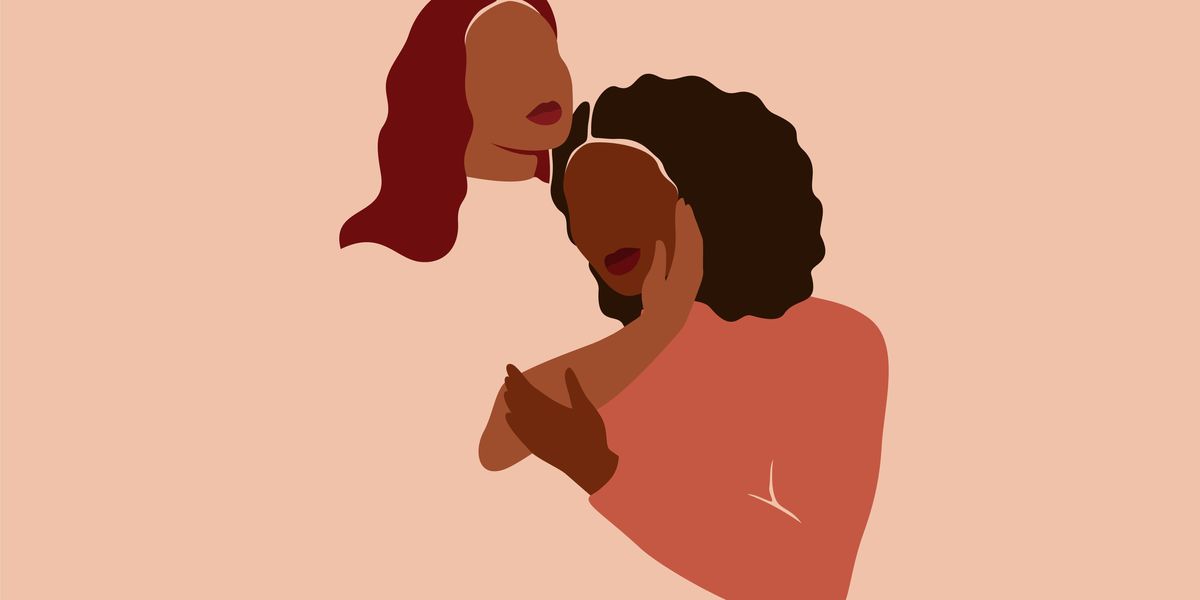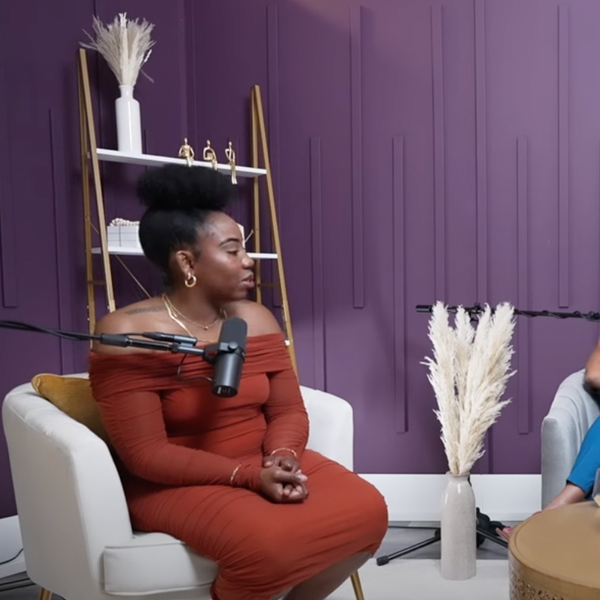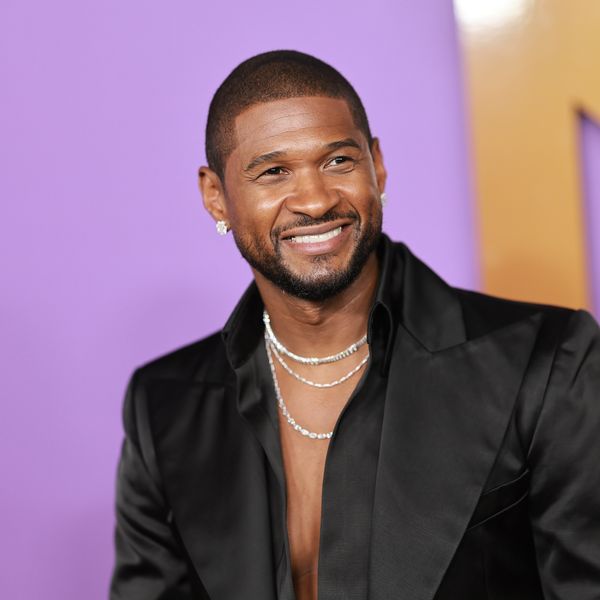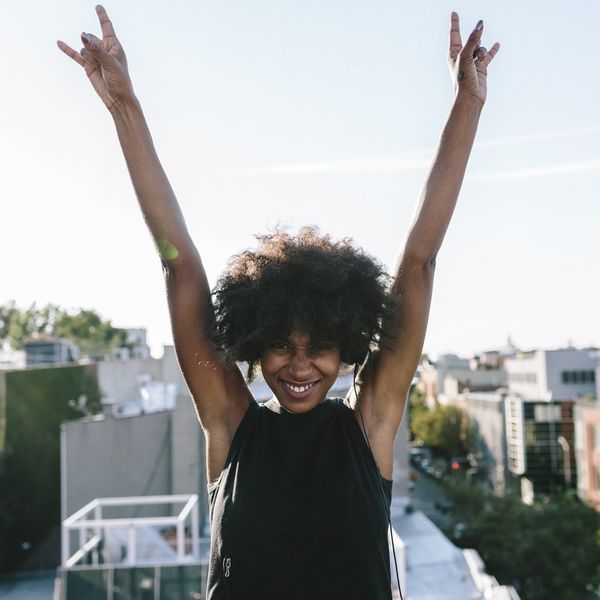
A Black Trans Woman’s Coming Of Age
I am a foreign woman, in every definition of the word. I am all of the things that it evokes in feeling, memory and sound. I am a womanhood that exists on the outside of history, record, country, marriage and love.
In this blank space, at the edge of the world, I peered over. This is where I began my journey into more than womanhood, but into the creation of a new world, a place where women like me are loved.
The chasm in between the two is where I found myself, though it required a bit of a fall. I grew up thinking that the world was a place of great freedom. I came of age thinking that the world was one of great lack. How did we get here? Girls and little queer kids with eyes full of bright possibility at the wonder and mystery of life turn to women who recoil from living. If I had a daughter, how would I save her from the brutality of being shamed into acts of humility that deny her life?
I vastly underestimated that some people use a deeper understanding of you, not to love you more efficiently, but to hurt you more intimately.
When I first embraced myself and openly embarked on the journey of womanhood, albeit a queer one, I was excited about the prospect of what a more modern world would have to offer a Black trans woman. I kicked off the weight of my teen years -- experiences that rendered me both invisible and hypervisible -- and fearlessly led with exploratory pride in my multilayered identity. I truly believed that the only barrier the world had to loving women like me was a lack of understanding and misplaced memory. I believed that if I spoke truthfully enough that I could help set the world on the course of miracles. There was a robust history of women who had done the same and now was the turning point. This wasn’t untrue, however I vastly underestimated that some people use a deeper understanding of you, not to love you more efficiently, but to hurt you more intimately. And therefore, I learned to use discretion in where I place my energy.
This is a lesson I learned both romantically, professionally and in my own personal activism. Slowly, I began to realize that there is no convincing someone to love you and anyone who pretends that there is, by demanding the education of your pleading, is exploiting your need.
Whether it be people who love to watch you labor for love in the interest of their own validation, at best; or collective movements that are hellbent on misunderstanding you for nefarious political ends, at worst. You especially cannot convince the many people you meet as an “othered" woman, who waffle back and forth between obsession, desire, need and refusing you their heart because you are the "wrong type" of woman. Ultimately, there is freedom in not being able to convince anyone to love or accept you. Only then can you put down your arms and allow love to blossom wildly, where it wishes, rather than trying to bend the earth where its brutality denies you.
Venus, in fact, was teaching me: How not to pour my offerings into the plates of other people and their gods, but to pour the best of myself first in the temples of love in my own heart.
For so much of my life, it really felt like Venus, the Goddess of love herself, was really coming down to tell me, “You are just not that girl.” Slowly, I learned that Venus, in fact, was teaching me how not to pour my offerings into the plates of other people and their gods, but to pour the best of myself first in the temples of love in my own heart. Within this temple, I found my heart atop an altar rather than trying to find value within romantic relationships that finally validate the social markers of my womanhood. It is a grueling lesson in love, but one that each of us must learn in the journey back to our own humanity.
The biggest lesson I learned was that not even a legacy of colonialism and its present imperialism can deny my humanity. It can create material conditions that threaten my life and disrupt the systems that are for my survival, but it can not move me out of my own body and lay claim to my soul or birthright as a divine being on this planet. I do not have to fight for love. It endures within me. I do not have to shrink from desire, it is an expression of my hunger for living and emboldens me to be more alive. I do not have to carve acceptance out of my own blood, because I am never forgotten or alone, as long as I do not forget or abandon myself.
I do not have to fight for love. It endures within me.
Now, as a slightly more experienced woman, my values are the same. They are just more embodied. Being Black is more about the moments of private comfort that I truly embrace myself and find peace, instead of trying to bend the world to my will and shout it into loving me. Being a transgender woman is more about the recognition of what it means to be alive, instead of forcing myself into a static and restrictive ideal, and therefore receptive to the mystery of the feminine; to be trusting enough in that mystery to remain open, while confident enough to enforce boundaries without the fear of being abandoned for expressing human needs and desires. In this space life gives to me, though I don’t always understand or know what the final fruit will yield, I give life back with my offerings of creation in response to it.
My moments of embodied womanhood and humanity are now about looking at myself, not through the eyes of what is considered to have social value, but through my own eyes before I learned any of those things.
In the blossoming of this new world and in the creative act of opening its door, I invite you into more love. I invite you into seeing yourself, not through an imagination of lack and competition, where you “are” because others “are not.” I invite you into new eyes. I invite you into a feeling of “enoughness.” I invite you into strangeness, a place that never denies the contradiction of your need in response to the harshness of the world. I invite you into embodied being, a place where women like you are always loved because it is an undying act that will always find its way back home.
Read all of the stories in the Issa Rae: She Comes First editorial series here.
Featured Image: Ponomariova_Maria / Getty Images
Let’s make things inbox official! Sign up for the xoNecole newsletter for daily love, wellness, career, and exclusive content delivered straight to your inbox.
How This New Bond Repair Line Transformed One Mother's Postpartum Shedding Into The Ultimate Curl Comeback
This article is in partnership with SheaMoisture
For Crystal Obasanya, her wash day woes came shortly after her son did. The beauty and lifestyle content creator had been natural for years, but during postpartum, she quickly learned about one reality many mothers can relate to experiencing: postpartum hair loss. “Sis had thinning hair. Sis had split ends,” she shared about her hair changes in a Reel via xoNecole.
Over a year into her postpartum journey, Crystal explained she also had dry, brittle hair, noting that keeping it hydrated before pregnancy had already been “a task.” The 4C natural recalled going from thick hair during pregnancy to a thin hairline due to postpartum shedding as “devastating.” When it came to strengthening and revitalizing her hair, the new SheaMoisture Bond Repair Collection was just the thing she needed to elevate her damaged coils to revive and thrive status and get them poppin' again.
SheaMoisture is providing us with the cheat code for transforming dry and damaged strands into thriving and deeply nourished crowns. By unveiling their 4-step hair system, the SheaMoisture Bond Repair Collection is equipping you with the tools to reverse signs of hair damage caused by protective styling, heat, and color and is uniquely formulated for Type 3 and 4 hair textures.
The haircare system revives damaged natural hair by repairing and rebuilding broken hair bonds through a game-changing combination of HydroPlex Technology and AminoBlend Complex, a unique blend of fortifying amino acids formulated specifically for curly and coily hair. Scientifically proven to reduce breakage by 84% and make your hair six times stronger (vs. non-conditioning shampoo), the collection infuses your hair with the nourishment it craves and the strength it deserves.
All five products of the SheaMoisture Bond Collection are infused with natural strengthening ingredients like Amla Oil and fair-trade shea butter. The collection consists of the 4-step breakage-fighting Bond Repair system, as well as the Bonding Oil.
“When trying it out, I quickly noticed that my hair felt revived and renewed, and my curls were so hydrated,” Crystal said while using the Amla-infused Bond Repair Leave-In Conditioner. “I also felt my hair strands were stronger.” So much so that the influencer felt brave enough to get her hair braided shortly thereafter. “I can definitely say that I will be keeping it in my hair wash routine,” she added in the caption of her Reel about her positive experience using the products.
SheaMoisture Bond Repair Collection is making bond-building a key player in your wash day routines and the purveyor of life for thirsty manes. Because who doesn't want stronger, shinier, happier hair?
Step One: Bond Repair Collection Shampoo
Rejuvenate your hair with SheaMoisture Bond Repair Shampoo, your go-to solution for luscious locks. Packed with hella hydration power, this shampoo adds moisture by 60% while removing buildup without stripping your strands. This shampoo gently cleanses impurities while significantly enhancing shine, smoothness, and softness.
The Bond Repair Collection Shampoo is the first step in the 4-step Bond Repair system, all of which are powered by the uniquely formulated AminoBlend, and HydroPlex, SheaMoisture’s technology that rebuilds hair strength at its core.
Step Two: Bond Repair Collection Conditioner
Tailored to repair styling damage, this creamy conditioner locks in 12x more moisture than standard non-conditioning shampoos, boosting damaged hair strength by 1.5x with significantly less breakage. The creamy SheaMoisture Bond Repair Collection Conditioner deeply hydrates, enhances manageability, and leaves your hair looking healthier and shinier.
Step Three: Bond Repair Collection Masque
This Ultra Moisturizing reparative masque is a moisture-rich game-changer for those dealing with the aftermath of hair damage caused by styling. The SheaMoisture Bond Repair Collection Masque delivers 13 times more moisture compared to non-conditioning shampoos, ensuring your hair feels nourished and soft. Designed to repair and rejuvenate, this masque significantly strengthens damaged hair — making it twice as strong while reducing breakage.
Step Four: Bond Repair Collection Leave-In Conditioner
Elevate your curl game with SheaMoisture’s Bond Repair Collection Leave-In Conditioner. Lightweight and hydrating, the Bond Repair Leave-In Conditioner provides 12x more moisture than non-conditioning shampoos and tames frizz with 24-hour humidity control. Designed to define curls and coils, the leave-in conditioner enhances softness and shine allowing you to detangle effortlessly.
Bonding Oil
The SheaMoisture Bond Repair Collection Bonding Oil is a multitasking all-in-one formula that acts as a heat protectant and provides the hair with moisture, strength, shine, damage protection, and intense nourishment. This lightweight oil not only offers 24-hour frizz and humidity control but also fortifies your tresses, making them up to 5 times stronger with significantly less breakage.
Featured image courtesy
Draya Michele And Jalen Green Address Backlash Over Age Gap In Their Relationship
Romantic relationships with significant age gaps often attract heightened attention and scrutiny, especially when they involve an older woman dating a much younger man.
This criticism is usually viewed as a double standard, considering society's general acceptance of couples like Jay-Z and Beyoncé or Julius Tennon and Viola Davis, where the male partners are over a decade older than their female spouses.
The debate surrounding age gaps in celebrity relationships reignited in March when Draya Michele, a 39-year-old former reality star and entrepreneur, revealed she was expecting her first child with her boyfriend, 22-year-old Houston Rockets player Jalen Green, after nearly a year together. Immediately following the announcement, Michele, who has two sons from previous relationships, faced massive backlash due to the couple's 17-year age difference.
In response to the scrutiny, Michele posted a quote on her Instagram story, which has since been deleted, suggesting she was comfortable with being "misunderstood." The post read, "Get comfortable being misunderstood. Only a fraction of people will be able to truly grasp your essence. You are not on anyone else's timeline of comprehension."
Since then, the couple welcomed their daughter in May and maintained a relatively low profile regarding their relationship. However, during a recent outing in Hollywood, Michele and Green shared their thoughts with TMZ about the criticism they have received.
Draya And Jalen On Age-Gap Backlash
When asked about the online chatter surrounding their relationship, Michele revealed the couple's strategy for dealing with negativity. "We try to stay off the internet and not really listen to that kind of stuff," she explained.
Green echoed this sentiment, stating they don't care about the public backlash. The former Basketball Wivesstar elaborated that they strive to live as normally as possible by blocking out the hate.
“We block it out and we mind our business,” she stated.
When questioned about why she was facing scrutiny despite the pair looking the same age, Michele disclosed that the entire ordeal was strange.
“I don’t know what people’s problems is,” she said. “We are two adults– being in love. I don’t know why that would rub people the wrong way. It’s kind of weird. Love is love at the end of the day.”
Let’s make things inbox official! Sign up for the xoNecole newsletter for daily love, wellness, career, and exclusive content delivered straight to your inbox.
Feature image by Frazer Harrison/Getty Images









